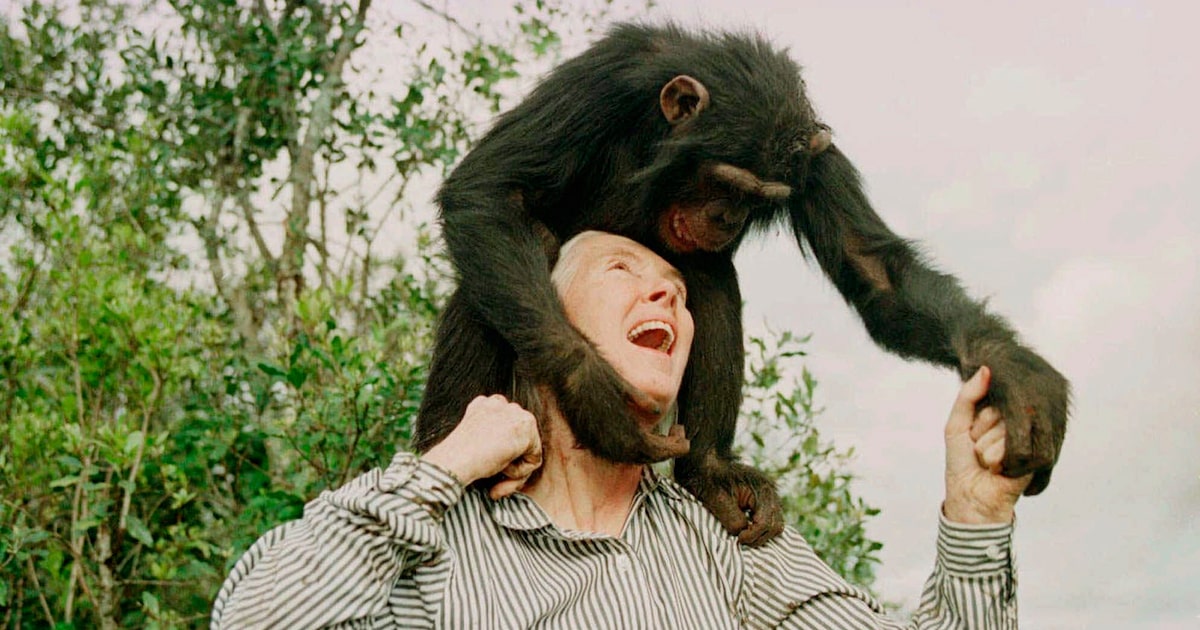Jane Goodall is the most introverted person I have ever met, unless it’s Woody Allen, whom I saw play the clarinet in a small ensemble in New York without ever looking at anyone, much less speaking to them.
Goodall was much the same when I interviewed her in Dallas in 1990 for the first in a KERA series called “Conversations.” She spent the morning in Fort Worth, and Debra Skriba, our producer, drove her back to the Quadrangle where a set had been found for the program at an import gallery specializing in artifacts from Africa and Asia.
It was perfect for this doyenne of Tanzanian ethnology, who succeeded at first on sheer talent before her employer Louis Leakey, renowned Kenyan paleontologist, sent her to Cambridge to study the work for which he already had her in mind. Goodall had been hired at first as a secretary, but Leakey knew right away what he had found: a born scientist with a passion for animals that informed her meticulous observations of them, undiluted by sentimentality no matter how genuine the affection.
Skriba reported later that Goodall had spoken not a word on the hour’s drive from Fort Worth to Dallas. Nor, upon arriving, did she evidence any connection to the project or to any of us waiting for her. She looked older than her years that day, owing perhaps to her uncolored hair, pulled back simply and tied at the neck, no makeup, no concessions whatsoever to the cosmetics people who would have hated having to know that she never aged beyond that day. Photographs of her at 91 are much the same as those from decades before.
Opinion
Goodall settled into a chair with no fuss, still on a planet of her own, and put on a mic with so little movement it was clear she knew what she was doing, it was habitual, but still no chit-chat at all. With the first question, however, she came to life and gave us a vivid account of the world I thought she might never let us enter. Flo, David Greybeard — these chimpanzees were her friends as well as the objects of her work, the keys to her accomplishments. But she never thought in those terms.
She wanted to know this community of creatures so like her own, or so she believed. Goodall was determined to understand the relation we and they have to each other. Through days upon days of sitting on a hillside, alone except for a camera, in Tanzania, she watched and waited and learned. She saw males putting their powers on display to attract a mate, or maybe just a love interest for the afternoon. She saw other male chimps fight ferociously for dominance or whatever it is that motivates such savagery. She saw communities withdraw from a member who is ill, maybe mortally ill though maybe that phrase applies only to humans. And she saw in these chimpanzees behaviors she had seen before, many times, among her own species.
It was, of course, her introversion that permitted Jane Goodall to sit for hours on that hillside, quiet and motionless lest she disturb the lives unfolding before her. For an extrovert it would have been unendurable. Even so, she pushed herself further out into the world as the years went on to combat cruelty to animals, something she abhorred. By the end of her life she was on the road constantly, fighting for nature and for all of its creatures.
Jane Goodall died October 1 on a speaking tour in Los Angeles. I heard the news and late that night pulled from a shelf in my office a book of hers, bought to prepare for that interview years ago. Called In the Shadow of Man, I found inside this inscription: “For Lee, I have so enjoyed talking with you. Thank you. Jane Goodall.”
Lee Cullum is a Dallas journalist and former host of Conversation on KERA.
We welcome your thoughts in a letter to the editor. See the guidelines and submit your letter here.
If you have problems with the form, you can submit via email at letters@dallasnews.com
